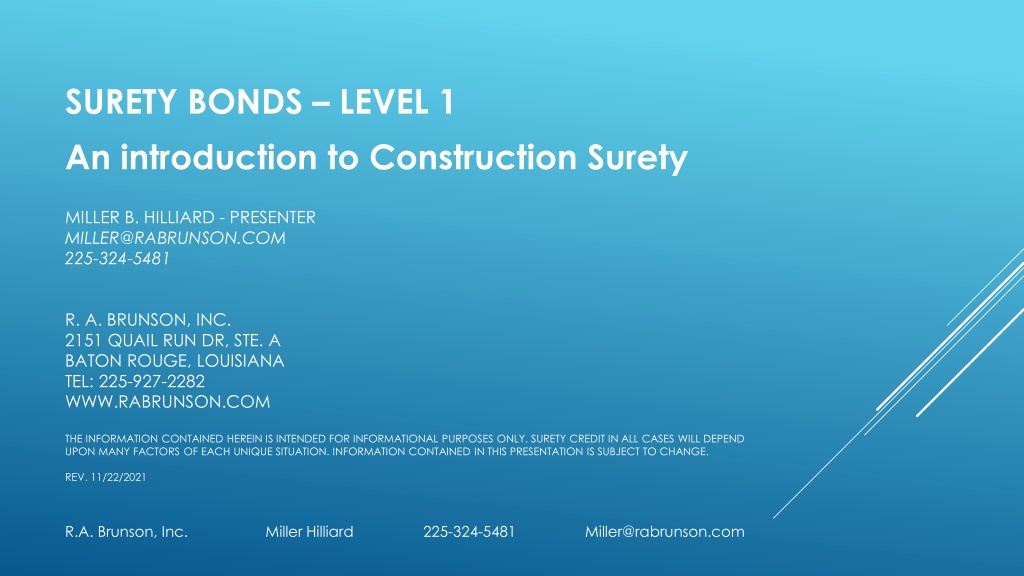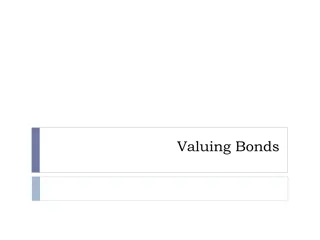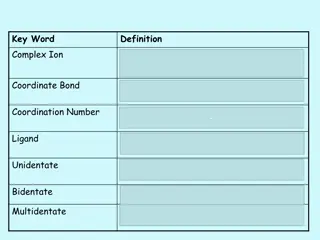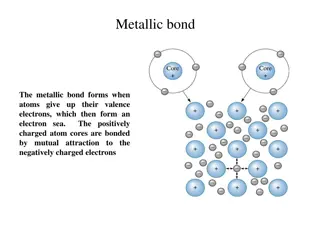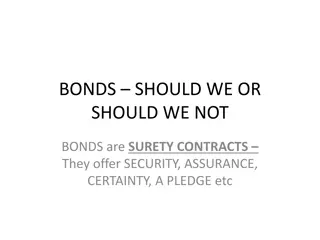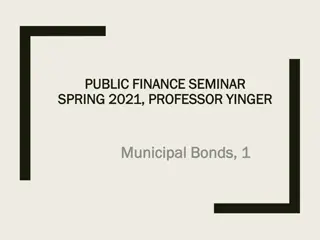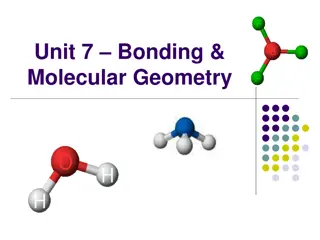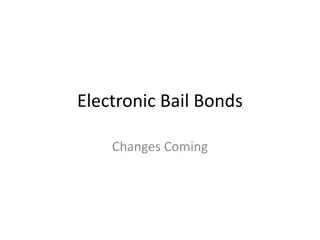Understanding Construction Surety Bonds
An overview of construction surety bonds including the parties involved, the differences between bonds and insurance, and how to set up a bonding program for contractors. Surety bonds provide financial security for projects by guaranteeing that contractors will perform as promised and pay their obligations. Establishing a bonding program involves fast-track and standard options based on creditworthiness and financial stability. Unlike insurance, surety bonds involve a three-party agreement where the contractor remains liable.
Download Presentation

Please find below an Image/Link to download the presentation.
The content on the website is provided AS IS for your information and personal use only. It may not be sold, licensed, or shared on other websites without obtaining consent from the author. Download presentation by click this link. If you encounter any issues during the download, it is possible that the publisher has removed the file from their server.
E N D
Presentation Transcript
SURETY BONDS LEVEL 1 An introduction to Construction Surety MILLER B. HILLIARD - PRESENTER MILLER@RABRUNSON.COM 225-324-5481 R. A. BRUNSON, INC. 2151 QUAIL RUN DR, STE. A BATON ROUGE, LOUISIANA TEL: 225-927-2282 WWW.RABRUNSON.COM THE INFORMATION CONTAINED HEREIN IS INTENDED FOR INFORMATIONAL PURPOSES ONLY. SURETY CREDIT IN ALL CASES WILL DEPEND UPON MANY FACTORS OF EACH UNIQUE SITUATION. INFORMATION CONTAINED IN THIS PRESENTATION IS SUBJECT TO CHANGE. REV. 11/22/2021 R.A. Brunson, Inc. Miller Hilliard 225-324-5481 Miller@rabrunson.com
OVERVIEW OF CONSTRUCTION SURETY A Bond is a three-party agreement between: The Principal Is a Contractor or Subcontractor who is required to put up a bond with the Obligee. Once bonded, the surety guarantees that Contractor will perform as promised and pay their subcontractors and vendors associated with the project. The Obligee Is an individual, partnership, corporation, government entity or the federal government. (Examples: City of Baton Rouge, East Baton Rouge Parish School Board, Army Corp of Engineers). The Obligee requires the guarantee so that the contractor will perform and pay vendors associated with the project. If not properly performed, the surety pays the Obligee for any damages or fulfills the obligation. The Surety A corporation (insurance companies are your primary sureties) who determines if the Principal/Contractor is qualified to be bonded for the project. If the Principal (Contractor) does not perform as promised, the surety performs the obligation or pays for any damages to the Obligee and pays any unpaid bills. R.A. Brunson, Inc. Miller Hilliard 225-324-5481 Miller@rabrunson.com
HOW DO I SET UP A BONDING PROGRAM? There are two types of bonding programs that a contractor can establish: Fast-Track Program: The fast-track bonding program is meant for smaller, less established contractors to easily obtain surety credit. The fast-track program underwrites based on personal credit and normally can be completely by one short application. However, the fast-track has a much lower capacity limit (normally up to $500,000 but can vary based on credit-worthiness) and has a higher premium rate than a standard program (normally 3%). Standard Program: A standard bonding program uses 3 years of company financials, personal financials, personal credit, business credit, experience, and a few other smaller factors to determine the contractor s worthiness. This program is much more involved to established, however provides the contractor the ability to bid & perform larger jobs, lower the bond premium, and allow the bonding agent/surety to better help the contractor through different aspects of their business. R.A. Brunson, Inc. Miller Hilliard 225-324-5481 Miller@rabrunson.com
HOW DOES A BOND DIFFER FROM INSURANCE? Insurance is a two-party agreement, whereas a bond is a three-party agreement. An insurance agreement is the transfer of risk from one party to another, whereas with surety the principal still has skin in the game in the form of an indemnity agreement. Sureties require the principal (contractor) to indemnify , which guarantees that the contractor will put up whatever available assets to ensure the completion of a job. The surety likes to say, We are promising to stand behind your company, so we want you to personally stand behind it as well. A surety underwriter will remind you quite often that they are in the business of pre-qualifying , not insurance R.A. Brunson, Inc. Miller Hilliard 225-324-5481 Miller@rabrunson.com
There are three main types of construction surety bonds: Bid Bond Often required by the entity requesting the bids. This is done to guarantee that each contractor submitting a bid has been pre-qualified by a corporate surety and should they be low, guarantees that the surety will issue and Performance & Payment bond. TYPES OF BONDS Performance Bond Protects the Obligee (i.e. City of Baton Rouge) from financial loss should the contractor fail to perform the contract in accordance with the terms and conditions. Payment Bond Guarantees that the contractor will pay subcontractors, laborers, and materials suppliers associated with the project (also known as labor and material payment bond). R.A. Brunson, Inc. Miller Hilliard 225-324-5481 Miller@rabrunson.com
BID BONDS: Why are bid bonds required? Bid bonds are required when bidding public projects ($150,000 for federal work, $50,000 for state work) to ensure that all bidders will be able to provide a performance & payment bond if they are the lowest bid. A bid-bond transfers the effort of pre-qualifying bidders from the government to a surety How much are Bid Bonds? Most entities require a bid bond to be for 5% of the bid price. This 5% is the penalty the surety must pay to the Obligee if they do not extend a Performance and Payment bond to the awarded contractor. This 5% is to cover the difference in the price of the low bidder and second-low bidder. Most sureties will issue a bid bond free of charge. What if I can t get a bid bond? If you do not (or cannot) get a bid bond, most entities will allow you to post a certified check in the amount of 5% with your bid. However, if you are the low bidder and cannot acquire a Performance & Payment Bond, then you will be forced to forfeit the check of 5%. R.A. Brunson, Inc. Miller Hilliard 225-324-5481 Miller@rabrunson.com
OTHER PROGRAMS TO HELP ME GET STARTED SBA Bond Guarantee: The Small Business Administration has established a Bond Guarantee program in which the SBA will secure up to 80% or 90% of the bond amount for the surety. (i.e. if the bond is for $100,000, the SBA will pledge to cover $80,000 of the bond to help the new contractor qualify) LED Collateral Assistance: The Louisiana Economic Development department has established a program with a few sureties to provide collateral on behalf of the contractor to help the contractor qualify for bonding. This program offers 25%, up to $100,000, in collateral to qualifying Louisiana-based, small or emerging contractors. R.A. Brunson, Inc. Miller Hilliard 225-324-5481 Miller@rabrunson.com
HOW DO I TAKE ADVANTAGE OF THESE PROGRAMS? Having a competitive bonding program and a competent agent on your team can make or break a small contractor. Knowing what surety is the best fit for you, what LED or SBAs programs you may qualify for, what changes needed to allow your business grow, and how to negotiate the best deal for you is essential. At R. A. Brunson, we pride ourselves on ensuring that our contractors always have the best available programs. Please feel free to reach out to Miller to help solve any/all of your bonding needs. R.A. Brunson, Inc. Miller Hilliard 225-324-5481 Miller@rabrunson.com
